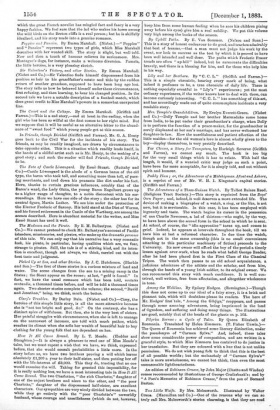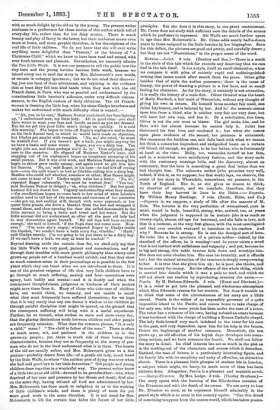with as much delight by the old as by the
young. The present writer confesses to a preference for those stories of this author which tell of every-day life, rather than for her fairy stories. There is much beauty and play of fancy in the latter, but their authoress seems even more at home, and more graphic therefore, in her descriptions of the real life of little children. We do not know that she will evei- write anything more delightful than "Carrots," or the history of " Christmas Child," which we know to have been read and reread, with ever fresh interest and pleasure. Nevertheless], we sincerely admire the Two Little Waifs. It is not our purpose to tell the public how the tiny hero and the young heroine became little waifs, because we intend every one to read the story in Mrs. Molesworth's own words, or remain in unhappy ignorance; but we do not miud their discover- ing just one item of their adventures, and rejoicing in the evidence that at least they fell into kind hands when they met with the old French dame, in Paris, who was so puzzled and embarrassed by the conscientious little heroine's adhesion, under very difficult circum- stances, to the English custom of daily ablutions. The old French- woman is dressing the little boy, when his sister Gladys interferes and makes her understand with much difficulty what is wanted Ah, yes, to be sure,' Madame Nestor exclaimed, her face lighting up, 'I understand now, my little lady. All in good time—you shall have water to wash your face and hands as soon as you are dressed. But let me get this poor little man's things on quickly. It is cold this morning.' She began to take off Roger's nightgown and to draw on his little flannel vest, to which he would have made no objection,
but Gladys got scarlet with vexation. No, no,' she cried, 'he must be washed first. If you haven't got a bath, you might anyway let us have a basin and some water. Roger, you are a dirty boy. You might join me, and then perhaps she'd do it.' Thus adjured, Roger rose to the occasion. He slipped off Madame Nestor's knee, and stepping out of his nightgown began an imaginary sponging of his small person. But it was cold work, and Madame Nestor seeing him begin to shiver grew really uneasy, and again tried to get him into his flannels. 'No, no,' said Roger, in his turn—he had left off crying now—even the cold wasn't so bad as Gladdie calling him a dirty boy. Besides who could tell whether, somehow or other, Miss Susan might not come to hear of it ? Gladys might write her a letter. 'No, no,' repeated Roger valorously, we must be washed first.' 'You too,' said Madame Nestor in despair ; 'ah, what children !' Bat her good- humour did not desert her. Vaguely understanding what they meant —for recollections began to come back to her mind of what Leonie's mother used to tell her of the manners and customs of her nurseries —she got up, and smiling still, though with some reproach, at her queer little guests, she drew a blanket from the bed and wrapped it round them, and then opening the door she called downstairs to the little servant to bring a basin and towel and hot water. But the little servant did nct understand, so after all the poor old lady had
to trot downstairs again herself. My old legs will have exercise enough,' she said to herself, if the Papa does not come soon. How- ever !"I'm sure she's angry,' whispered Roger to Gladys inside the blanket, 'we needn't have a bath every day, Gladdie." Hush,' said Gladys sternly. I'm not going to let you learn to be a dirty boy. If we can't have a bath, we may at least be washed.'"
Beyond drawing aside the curtain thus far, we shall only any that the little Waifs are very good, patient and conscientious, and go through their troubles with more gentle philosophy than ninety-nine grown-up people out of a hundred would exhibit, and that they show as much common-sense in their proceedings as is possible to the few years which they can boast when we are introduced to them. It is one of the greatest enigmas of life that very little children have to go through so much suffering, anxiety and fear—sometimes even agony, both bodily and mental—and it is doubly sad when the commonest thoughtfulness, judgment or kindness of their seniors might save them from it. Many of those who take care of children have, one would think, no memory, and are unable to recall what they must frequently have suffered themselves ; for we hope that it is very rarely that any one deems it wisdom to let children go through painful discipline that might be spared, on the ground that the consequent suffering will bring with it a useful experience. Farther, let us remark, what strikes us more and more every day, that the glaring distinctions made between children and older people are frequently mistakes. What does the common phrase, "It is only a child," mean ? "The child is father of the man." There is often as much sense, wit, and patience in the children as in the grown-up people ; yet there is much risk of their losing these characteristics, because they are so frequently at the mercy of per- sons who do not in the least understand what is in them. The hearts of the old are usually softer, and Mrs. Molesworth gives us a fine picture—probably drawn from life—of a gentle old lady, much loved by the little Waifs, to whom "the saddest part of dying was over when she had said good-bye to her little favourites." Old people and young children draw together in a wonderful way. The present writer knew of a little two-year-old child—devoted to its grandmother—who, when deprived of her care and presence by her illness and death, died also on the same day, having refused all food not administered by her. Mrs. Molesworth has done much to enlighten us as to the working of little children's minds, and there is plenty of room for yet more good work in the same direction. It is not usual for Mrs. Molesworth to lift the curtain that hides the future of her little
protitg6es. But she does it in this story, to our great contentment. Mr. Crane does not study with sufficient care the details of the scenes which he professes to represent. His Waifs are much further apart in age than Mrs. Molesworth's. Mr. Crane adds nearly half-a-dozen, years to those assigned to the little heroine by her biographer. Save for this defect, the pictures are good and pretty, and carefully drawn ; but they are not "illustrations," in the proper sense of the word.







































 Previous page
Previous page